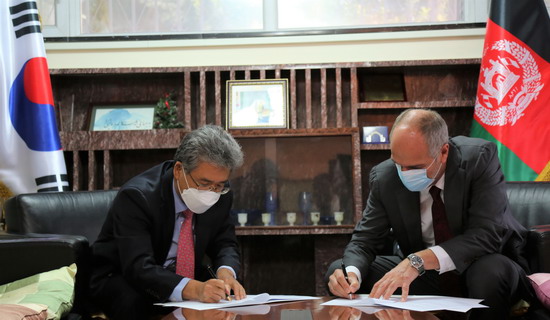 Zha Hyoung Rhee, H.E. the Ambassador of the Republic of Korea in Afghanistan, and Dr Richard Peeperkorn, WHO Representative for Afghanistan, sign grant agreement
Zha Hyoung Rhee, H.E. the Ambassador of the Republic of Korea in Afghanistan, and Dr Richard Peeperkorn, WHO Representative for Afghanistan, sign grant agreement
14 September 2020- The Embassy of the Republic of Korea in Afghanistan signed a grant arrangement with the World Health Organization (WHO) in Afghanistan today to support a new project aimed at supplementing the country’s efforts to reduce morbidity and mortality due to COVID-19. Under the arrangement, WHO Afghanistan will receive about US$ 1 million in assistance from the Government of the Republic of Korea to implement the “Strengthening access to quality health care in the most vulnerable population in Afghanistan” project, over a 6-month period.
The project is expected to bolster efforts to increase COVID-19 testing across the country through the provision of specimen collection kits for 15 rapid response teams (RRTs), which will enable sample collection from 40 500 people; provision of diagnostic kits to the Ministry of Public Health to cover testing for 50 000 people, and provision of testing consumables for RRTs and laboratory technicians across the country to cover testing needs for at least 10 520 people. The project will also play a critical role in improving awareness about COVID-19 through community-based engagement, targeting 314 900 people across priority regions of the country and building field teams’ capacity to better engage and communicate with communities.
The grant arrangement was signed by Zha Hyoung Rhee, H.E. the Ambassador of the Republic of Korea in Afghanistan, and Dr Richard Peeperkorn, WHO Representative for Afghanistan, at a ceremony held at the Embassy of the Republic of Korea. Ambassador Rhee and Dr Peeperkorn emphasized the importance of continued support from the international community to help Afghanistan in its fight against COVID-19.
“While the pandemic does not respect borders when it comes to its negative impacts, there is no denying that those countries which lack in medical infrastructure are more vulnerable,” said Ambassador Rhee. “Considering Korea’s experiences, 3Ts, i.e., testing, tracking, and treatment constitute the major components of an effective response to the pandemic. I sincerely hope that the support from Korea, especially regarding the earliest stage of those response activities, will help mitigate, to a considerable extent, the impact of the pandemic which has been inflicting enormous damage not only on the already dire humanitarian situation but also on the essential socioeconomic fabric of Afghanistan,” Ambassador Rhee added.
More than 6 months since the onset of the COVID-19 emergency in Afghanistan, cases continue to rise. As of today, 38 772 confirmed cases and 1425 deaths have been reported. Support provided by the Government of the Republic of Korea under this project will not only address urgent COVID-19 health needs but will also contribute towards building and strengthening a more resilient health system.
“The crisis is far from over,” said Dr Peeperkorn. “Afghanistan has gone through a substantial first wave of COVID-19. We need to be better prepared for secondary spikes. As the country tackles the impacts of the pandemic, we must not lose focus on other pressing needs. Afghanistan needs continued and sustained solidarity and financial support from the international community to minimize healthcare disruptions, ensure maintenance and strengthening of essential health services and prepare for long-term social and economic recovery. WHO Afghanistan highly appreciates the valuable support of the Government of the Republic of Korea as it will help in boosting urgent COVID-19 response activities and in building a robust health system in the long run,” Dr Peeperkorn added.
The Government of the Republic of Korea has been a long-standing supporter of Afghanistan’s health sector and has collaborated with WHO on several initiatives such as capacity-building of RRTs during the 2019 drought and facilitating international training of health workers on primary health care.
The “Strengthening access to quality health care in the most vulnerable population in Afghanistan” project is a part of the COVID-19 ONE UN Health Response Plan and is aligned with the overall support that WHO is providing to the Government of Afghanistan to address needs related to COVID-19.
Notes to Editor
WHO has defined 9 pillars that guide preparedness for and response to COVID-19 at the country level:
- coordination and response planning
- risk communication and community engagement
- surveillance, rapid response and case investigation
- surveillance and awareness at points of entries
- expansion of testing laboratories and staff training
- infection prevention and control
- case management
- operational and logistics support
- essential health services.
Aligned with and complementary to the Government’s approach, the United Nations in its assistance to governments and partners is focusing its COVID-19 support on three areas given the far-reaching implications of the pandemic. These include, health, which is led and coordinated by WHO, humanitarian support, and social protection and economic recovery.
For further information please contact:
Bisma Akbar
Communication Officer








